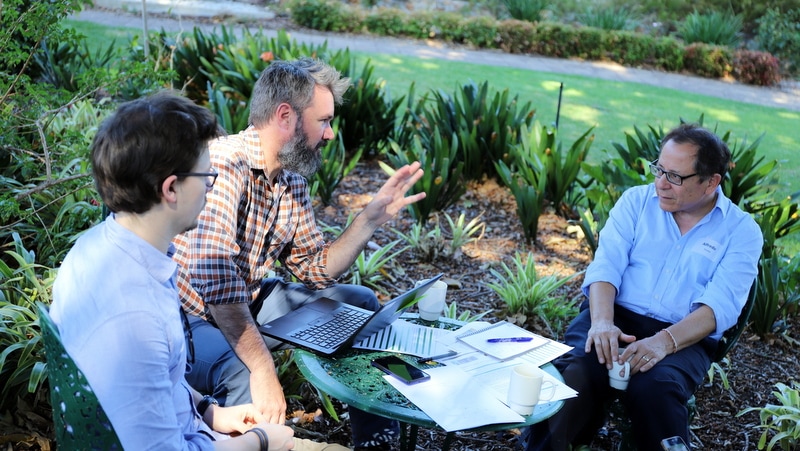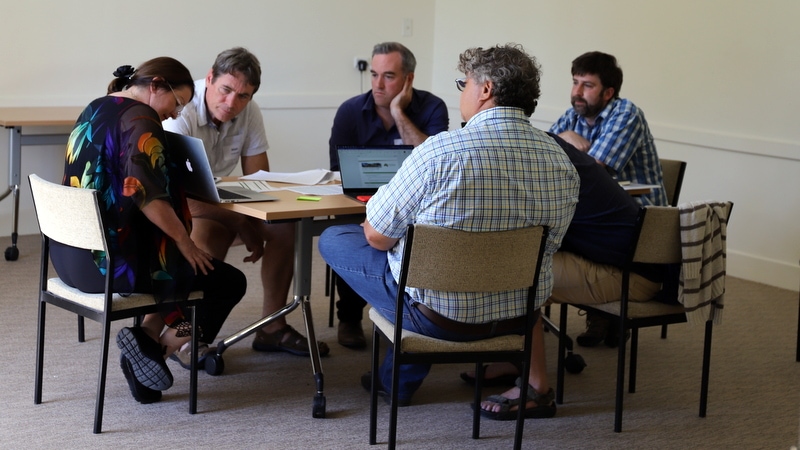Ecosystem scientists and managers from around Australia gathered recently to participate in a wide consultation process that will frame the directions and priorities of TERN’s Ecosystem Surveillance monitoring capabilities.
In late March, 25 ecosystem scientists—representing a range of disciplines, organisations, and career stages—gathered in Adelaide for a workshop to develop the future priorities of TERN’s Ecosystem Studies platform.
The purpose of the workshop was to seek input from a representative group of current and potential users to enhance the delivery and impact of TERN’s plot-based ecosystem monitoring infrastructure. The workshop is a key component of TERN’s ongoing activities to engage with our community more often; deliver more data products and tools; provide the training courses you ask for; and welcome more researchers to our field sites.
Thank you to everyone who joined our Ecosystem Surveillance monitoring workshop! We're privileged to be able to incorporate the knowledge & innovative ideas of many of Australia's leading scientists! #NRCISimpact pic.twitter.com/S6hYxDZM24
— TERN (@TERN_Aus) March 20, 2019
“The workshop was a great opportunity to have a constructive discussion about TERN Surveillance, ecological monitoring and building Australian capability—as well as learn from Australia’s leading scientists and practitioners about their work areas and interests,” said participant Fiona Dickson of the Australian Government’s Department of Environment and Energy.
The number of disciplines, organisations and perspectives represented at the workshop reflected the diversity and complexity of ecosystem science as a field, and led to comprehensive discussion around questions such as:
- How are TERN Ecosystem Surveillance data and samples currently being used?
- What innovative products and services could be developed using TERN Ecosystem Surveillance data and samples?
- What opportunities do we have to advance the delivery of ecosystem science and management in Australia over the next 50 years?
Always looking for new ideas from our community
The workshop started with some fantastic presentations by participants on their current research, often using TERN infrastructure, and their roles and potential contributions to the workshop.
Ashlea Doolette of @UniofAdelaide @waiteresearch on how she's using TERN samples to teach students about biodiversity. Ashlea's also developing novel approaches to fertiliser use that may save agricultural industries $millions/yr: https://t.co/P1Cg8hQMcN #NCRISimpact #agchatoz pic.twitter.com/bOzwd9MI6D
— TERN (@TERN_Aus) March 19, 2019
Longtime TERN user & collaborator, Stephen van Leeuwen of @ExploreParksWA on the need for good info & data for good #science & decision making. We're proud to work with Stephen on WA Birriliburu Indigenous ranger knowledge exchange, skills training, & monitoring projects. pic.twitter.com/M33MFvLECk
— TERN (@TERN_Aus) March 18, 2019
Graeme Finlayson showing the increasing overlap of @BushHeritageAus & TERN sites. Our collaboration makes the best use of on-ground ecosystem monitoring resources. #NCRISimpact #environment #rangelands pic.twitter.com/sVyjY2YaTQ
— TERN (@TERN_Aus) March 18, 2019
Participants then started shaping the future of ecosystem surveillance monitoring in Australia. A key component of this was an entertaining project development activity in which participants formed working groups and brainstormed potential R&D-type applications using TERN data.
Five exciting new integrated projects were presented, ranging from soil analyses, ecology, and genomics through to landscape-scale spatial data linkages and modelling. Participants then used pretend bank cheques to ‘fund’ the project they thought was most needed by the research community.
‘Funds’ were reasonably evenly spread but the eventual winner was ‘ReTERN of the GEDI’, which proposed linking vegetation height measures from TERN Surveillance plots with Terrestrial Laser Scanning and biomass data collected at other TERN sites to improve the calibration and validation of data from NASA’s Global Ecosystem Dynamics Investigation (GEDI) mission.
The other popular project was ‘Sensor-ative New Age Plots Initiative, or SNAPI’, which proposed using phenocams at TERN Ecosystem Surveillance plots to build metrics or time series of cover that can be up-scaled across biomes.
“I hope that participants follow through with their proposed projects,” says TERN Ecosystem Surveillance’s lead Associate Professor Ben Sparrow of the University of Adelaide.
“We are always very happy to receive new ideas from the research community and I encourage more people to reach out, collaborate, and help shape the future of TERN’s ecosystem surveillance monitoring infrastructure.”
- For information about TERN’s Ecosystem Surveillance platform and how you can use its data and samples, explore the TERN website.









